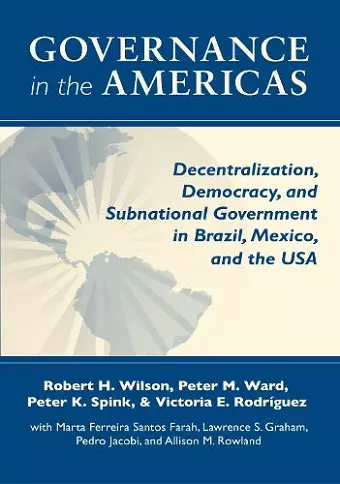Governance in the Americas
Decentralization, Democracy, and Subnational Government in Brazil, Mexico, and the USA
Robert H Wilson author Victoria E Rodriguez author Peter M Ward author Peter K Spink author
Format:Paperback
Publisher:University of Notre Dame Press
Published:1st Mar '08
Currently unavailable, and unfortunately no date known when it will be back

Governance in the Americas, a multidisciplinary volume, offers important new insights about decentralization, federalism, and democratic change in the three largest federal nations in the Americas: Brazil, Mexico, and the United States. Originating in a major research project conducted by teams in each of the three countries, this study contributes significantly to our understanding of how representative and participatory democracy is being constructed at state and local levels in the recently emerged democracies of Brazil and Mexico, and is being recast and sustained in the United States. The contributors evaluate the performance of subnational governments, as these societies become more genuinely decentralized, and as new actors and managerial routines create and implement public policy. The authors challenge the criticism of “exceptionalism” in the United States, seeking instead to understand the points of convergence and divergence among the three countries as each seeks to improve the effectiveness and public accountability of its policy-making processes.
Collaborators include Marta Ferreira Santos Farah, Lawrence S. Graham, Pedro Jacobi, and Allison M. Rowland.
“This edited volume examines intergovernmental relations and democratic governance in Brazil, Mexico, and the US. The four editors begin by explaining why this research team examined the three largest federal polities (in terms of population size) in the Americas and what questions they strive to answer. The other five chapters examine how feudalism evolved over two centuries, how the three branches of government operate across the national and subnational levels, contemporary trends in the decentralization of public policy, the interaction between civil society and various levels of government, and reflections on where feudalism is headed in the 21st century.” —Choice
“[Wilson] explores, from different disciplinary perspectives, the complexities of governance and formulating public policy at the subnational level in three federal countries of the Americas: Brazil, Mexico, and the United States. In addition to discussing vertical relations between the national and subnational governments, the authors also discuss horizontal relations between subnational governments.” —Book News
“The book emerged out of a promising intellectual project. The co-authors, all experts in public policy, combine considerable knowledge of both Mexico and Brazil. The idea of comparing the three largest federal systems in the Americas excites the imagination, given its potential to advance our understanding of how federalism shapes democratic development (or vice versa).” —Journal of Latin American Studies
“Throughout the world, subnational levels of government are actively absorbing new responsibilities and resources; they are simultaneously under pressure to be more responsive and democratic. But where have these changes come from? How are they affecting the governance of political systems? Will citizens be better off as subnational governments assume a greater role in making decisions and managing public policies and services? This important volume, exploring decentralization and democratization at the subnational level in Mexico, Brazil, and the United States, provides deeply informative responses to these questions. It is a well-crafted ‘must’ for students of decentralization and governance.” —Merilee S. Grindle, Director, David Rockefeller Center for Latin American Studies, Harvard University
“This book is ambitious in scope, synthesizing political patterns in three of the hemisphere’s largest countries and most complex economies, discussing a multitude of subnational actors and institutions in each of these countries, and covering broad stretches of time in each country.” —Kent Eaton, University of California, Santa Cruz
“The 21st century has brought a new interest in studying the relationship between structures of government and democracy. This book, focusing on three countries in the Americas, is a thorough and important example of the substantive consequences of recent decisions related to centralization and decentralization. It should be on the bookshelves of students of federalism and intergovernmental relations around the globe.” —Beryl A. Radin, American University
ISBN: 9780268044114
Dimensions: 229mm x 152mm x 22mm
Weight: unknown
352 pages